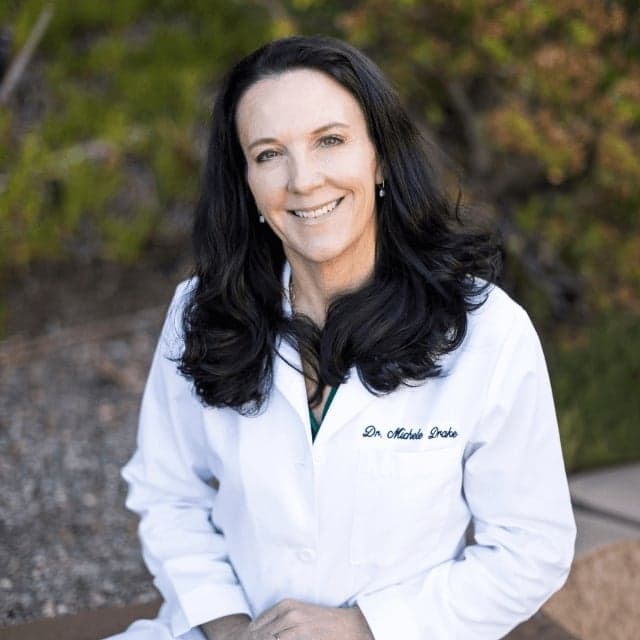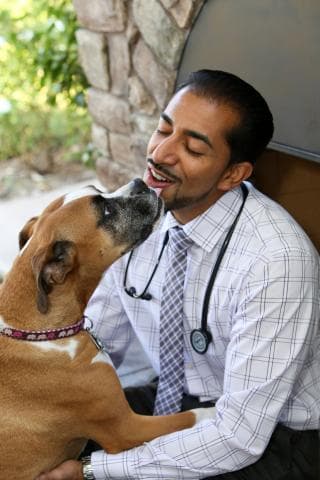Senior Cat Care Advice from Veterinarians
As someone who is doing research on caring for their aging cat by turning to the internet for answers, you've already shown your willingness to put in the work to ensure your feline has a long and healthy life. Just as caring for a kitten presents challenges, caring for a senior cat can mean some extra preparation, so it makes sense that you have questions. At GeniusVets, we firmly believe that petcare information should come from veterinarians and not from “Dr. Google.” That’s why we’ve taken FAQs on caring for senior cats, sent these questions to renowned veterinarians across the U.S., and compiled their replies to get you valuable information that you can trust.
Caring For Mature, Senior, and Geriatric Cats
While we've sourced all of the senior cat care information and recommendations below directly from leading veterinarians across the country, please make sure to seek out the advice of your own veterinarian or find a trusted vet near you using the GeniusVets Directory.
How will getting older impact the health of my cat?
Old age itself is not a disease because everyone ages differently, and that's true of our cats as well. However, just as with people, everything slows down a bit. As cats get older, they might want to play less. Their nutritional needs will change. Arthritis tends to develop, they can have vision or hearing problems, and they can experience kidney disease, thyroid issues, and some grooming or litter box issues. Kitty owners should be aware that with arthritis comes mobility issues, so it may be time to assess your cat’s arrangement to ensure they have easy access to their litter box, food, and water.
How do a cat's nutritional needs change as they age?
Nutritional needs vary based on your cat’s age and lifestyle. You started with a kitten-formulated food with more calories and different kinds of vitamins and minerals. As they age to adults, they have different protein, fat, calorie, and vitamin requirements. Then you get to your senior geriatric stages, in which the cat may need some things like joint supplements, probiotics, and other vitamins that help them continue to thrive.
There are many senior foods on the market, but most veterinarians will you that you don’t necessarily have to switch to these when your cat's considered a senior. It comes down to what their health and lifestyle are like, and then we make choices based on that. For example, if your cat's showing signs of early diabetes or kidney disease, we might elect to change them to a diet consistent with those diseases’ needs. Or if we have a kitty that's having more grooming issues, we might switch to a hairball diet to support that.
Lastly, you have to realize that as cats age, they aren't as active, and we see a lot of weight gain. Obesity is a genuine concern because the extra weight may cause issues with grooming themselves. They may be at higher risk for other diseases so that a prescription diet might be warranted.
What are some signs and symptoms that my cat might be slowing down?
Signs of slowing down are individual to the cat. Some kitties are active while others are couch potatoes, just like the rest of us, so things that can be indicative of slowing down are if all of a sudden our interactions with our cat change. For example, if you have a kitty that’s usually a lap cat but they're spending more time by themselves, that could indicate something is going on. For kitties that go outdoors, they may not want to do so as much. Cats with arthritis may be hesitant to jump on a counter or a table to look for stuff and investigate, and they may even begin to sleep on lower surfaces. Many cats begin to hide more as they age, although that can also indicate that they have pain or aren’t generally feeling well.
As veterinarians, we'd rather know about any behavior changes as your kitty gets older, as we can figure out if there’s some sort of medical issue sooner rather than later. In other words, don’t just chalk up a change in behavior to old age. For example, a cat that has a painful tooth that needs to be extracted may be acting older than they are due to the pain but, once that tooth is pulled, you could end up bringing home a cat that acts much more youthful than they have been in the recent past thanks to that pain management.
What are some health complications or diseases that are commonly experienced by senior cats?
One of the most significant issues we see in older cats beyond arthritis and mobility issues is kidney disease. A cat can get kidney disease at any age, but the onset is typically during the senior years. And that's often manifested as weight loss, vomiting, or changes in urine output. Your cat might start drinking and urinating more. We could also see issues with the thyroid gland (usually hyperthyroidism) in which the gland becomes overactive, and that's manifested as a ravenous appetite. In these cases, the cat will sometimes even act hyperactive, and with that, we could see vomiting and weight loss.
The other significant issue we see in older cats is dental disease. Cats’ teeth can develop tartar and gingivitis that can both lead to periodontal disease. And the most critical thing for cat owners to realize with dental disease is just because the cat is still eating doesn’t mean the disease and pain associated with it don’t exist. Cats are very resourceful and know they need to eat to survive, so they’ll figure out ways to eat with their teeth that aren’t painful. You need to watch out for food coming out of their mouths as they eat and drooling.
Other things we might see in an aging cat are:
- Heart disease
- Diabetes
- Cataracts
- Hearing loss
What kinds of preventative care can help extend the life of my cat?
Preventative care is a multi-pronged approach. A thorough physical exam by your veterinarian twice a year is essential for senior cats to assess health and keep up with age-appropriate vaccines. There are also specific blood tests to screen for those diseases we mentioned. As we also discussed, cats are good at hiding issues that, if they are showing symptoms, the disease is typically much further along. If we can detect these problems from a blood screen, urine tests, and x-rays before they become clinical or the cat loses weight, it often carries a better prognosis. We’ll also continue to check your senior cat for parasites and provide regular dental cleanings to prevent painful extractions.
There are many things that you can do at home to keep your cat healthy. Ensure that they don't have to work too hard to get to their litter box or their food and water. Perhaps they’ve always had to go downstairs to use the litter box; we may need to consider moving a litter box or adding a litter box to the floor where they spend most of their time. The same goes for food—if they usually eat on a counter, we may either need to help them up on the counter or consider putting their food on the floor. Also, exercise and enrichment are still critical to keep your cat stimulated, even into their senior years. Just as in humans, if cats don’t use it, they lose it.
Senior Cat Care Essentials
As cats age, their nutritional, mobility, and comfort needs change. These products are designed to support senior cats by addressing joint health, digestion, urinary function, and overall well-being. Always consult your veterinarian before starting new supplements or making changes to your cat’s routine.
Cat Joint Support Supplement
Formulated to maintain joint health and mobility in older cats, this supplement supports cartilage and reduces discomfort from age-related joint issues.
Purina Fancy Feast Senior Cat Food
Specially crafted for cats aged 7+, this recipe offers balanced nutrition with high-quality protein, essential vitamins, and a taste senior cats love.
Cat Treats for Senior Cats
These soft, easy-to-chew treats are made with senior cats in mind, often fortified with vitamins and minerals to support aging health needs.
Cat Digestive Support
Designed to promote healthy digestion in aging cats, this supplement can help manage sensitive stomachs and support nutrient absorption.
Cat Bladder Support
Ideal for senior cats experiencing urinary issues, this product promotes bladder health and may reduce the risk of infections or incontinence.
Furhaven ThermalNAP Self-Warming Cat Bed
A cozy, insulated bed that reflects your cat's body heat—perfect for senior cats who seek extra warmth and comfort for achy joints or chilly days.
Comparison Table
Here’s a quick look at senior cat essentials to help you find the best fit for your cat’s needs:
| Product | Main Purpose | Best For |
|---|---|---|
| Cat Joint Support Supplement | Supports cartilage, mobility, and joint comfort | Senior cats with stiffness or arthritis |
| Purina Fancy Feast Senior Cat Food | Balanced nutrition with protein and vitamins | Cats aged 7+ needing complete daily meals |
| Cat Treats for Senior Cats | Soft treats fortified with nutrients | Older cats who need gentle, easy-to-chew rewards |
| Cat Digestive Support | Aids digestion and nutrient absorption | Seniors with sensitive stomachs |
| Cat Bladder Support | Promotes urinary and bladder health | Cats with incontinence or UTI concerns |
| Furhaven ThermalNAP Self-Warming Cat Bed | Reflects body heat for added warmth | Seniors seeking comfort and joint relief |
Top Pick
Our top pick for senior cats is Cat Treats for Senior Cats. These soft, nutrient-rich treats are a gentle way to spoil your aging feline while also supporting their health and happiness.
Try Cat Treats for Senior Cats
Always consult your veterinarian before introducing new foods, supplements, or treats to ensure they’re right for your senior cat’s individual needs.
Why are wellness exams and regular checkups important for senior cats?
As we mentioned earlier, many underlying issues present during these exams that owners may not have noticed, as the cat and owner are together every day. It’s easy to miss things that come up gradually. And one of the main things we hear as veterinarians is, "Oh yeah, they're getting older, and they're slowing down." Remember that they could be slowing down due to more than just the aging process—it could very well be that they're constantly in pain, but they hide it so well.
We can find things like a painful tooth or underlying blood work during the wellness exams that could show us a troubling trend. We trend the blood year after year because, remember, cats age faster than us. If we do blood work one year and we say, "Hey, those kidney values are normal, but they're looking a little higher." And we follow it up within six months or a year and say, “That graph is trending up,” so we take action and do something as simple as changing the food. This simple act could save years of the cat’s life and many hospital visits.
What is the most important thing to know about caring for a senior cat?
The most important thing to remember about caring for a senior cat is that you're their best advocate, and you know them best. Cats can be challenging to diagnose because they're secretive creatures and can effectively hide dental disease, renal disease, and even arthritis. The better you know them as their pet parent, the better you're going to be able to tell when something's off—having that intimate knowledge of your cat's personality and normal activities can make a huge difference. If you notice any changes in their interactions, routines, appetite, grooming, or litter box habits, then your veterinarian will want to see them. They’d honestly prefer to hear from you once a week than have you wait until the problem has progressed so far that there is nothing they can do.
What are other ways you can tell that a cat might have dental problems?
Some signs that your cat might have dental problems are if they’re drooling, dropping food, only eating wet versus dry food, and perhaps bad breath or other odor.
Do senior cats still need vaccinations?
Most veterinarians vaccinate for the cat’s health risk. More so than using age as a factor, we determine what your pet is exposed to and recommend appropriate vaccines. Now, rabies is recommended for everyone across the board—every cat, no matter their age or lifestyle. But there are certain vaccines, like feline leukemia, that we don’t typically recommend if your pet is strictly indoors and no other cats are coming in and out of your home. Vaccinations are dependent on the cat. We have that conversation with you as a client and determine what is best for your pet.
The AAHA also has its own list of FAQs on both senior cat and dog care. If you have any further questions about getting senior cat care, ask your veterinarian. If you don’t have one yet, we can help you find a local veterinarian!
The Following Veterinarians
Contributed To The Cat Senior Care Information On This Page


The Ultimate Guide
to Cat Care
This free guide is an indispensable manual for cat ownership. Filled with veterinary advice and recommendations on every important topic at each stage of your cat's life, this is all the stuff that responsible cat owners need to know. That is why we are making it free!



